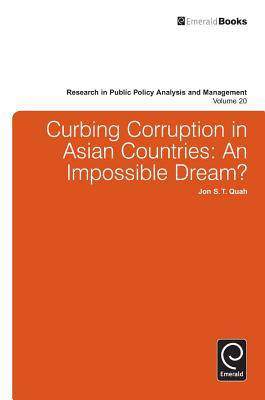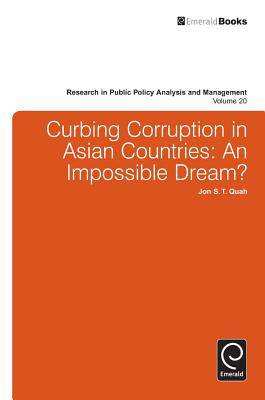
- Afhalen na 1 uur in een winkel met voorraad
- Gratis thuislevering in België vanaf € 30
- Ruim aanbod met 7 miljoen producten
- Afhalen na 1 uur in een winkel met voorraad
- Gratis thuislevering in België vanaf € 30
- Ruim aanbod met 7 miljoen producten
Zoeken
Omschrijving
As corruption is a serious problem in many Asian countries their governments have introduced many anti-corruption measures since the 1950s. This book analyzes and evaluates the anti-corruption strategies employed in Hong Kong SAR, India, Indonesia, Japan, Mongolia, the Philippines, Singapore, South Korea, Taiwan, and Thailand. These countries are selected because they represent the three major patterns of corruption control with Japan adopting Pattern 1 (anti-corruption laws without any anti-corruption agency [ACA]); India, the Philippines and Taiwan employing Pattern 2 (anti-corruption laws with multiple ACAs); and, Singapore, Hong Kong SAR, Thailand, South Korea, Indonesia, and Mongolia belonging to Pattern 3 (anti-corruption laws with a single ACA). Among the ten countries only Singapore and Hong Kong SAR have succeeded in minimizing corruption because of the commitment of their political leaders in curbing corruption, their favorable policy contexts, and the impartial implementation of effective anti-corruption measures. On the other hand, the other eight Asian countries have failed to curb corruption because of the lack of political will, their unfavorable policy contexts, and their reliance on ineffective anti-corruption measures.
Specificaties
Betrokkenen
- Auteur(s):
- Uitgeverij:
Inhoud
- Aantal bladzijden:
- 500
- Taal:
- Engels
- Reeks:
- Reeksnummer:
- nr. 20
Eigenschappen
- Productcode (EAN):
- 9780857248190
- Verschijningsdatum:
- 21/07/2011
- Uitvoering:
- Hardcover
- Formaat:
- Genaaid
- Afmetingen:
- 152 mm x 231 mm
- Gewicht:
- 997 g

Alleen bij Standaard Boekhandel
+ 737 punten op je klantenkaart van Standaard Boekhandel
Beoordelingen
We publiceren alleen reviews die voldoen aan de voorwaarden voor reviews. Bekijk onze voorwaarden voor reviews.











